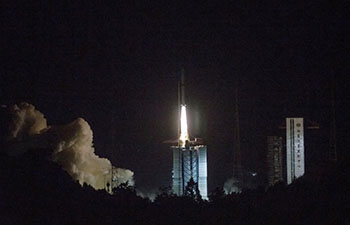KUNMING, May 23 (Xinhua) -- Scientist Yang Junxing, 56, has devoted himself to protecting rare fish species for 35 years and his method of breeding in captivity as a way to commercialized endanger species has proved successful.
"For so long, the protection of rare species was shouldered by the government and academic institutes. We have to fully mobilize the masses to ensure sustainable and more effective protection," Yang said.
Yang is a senior researcher with Kunming Institute of Zoology (KIZ) under the Chinese Academy of Sciences and a pioneering fish expert in China, who, with his team, has commercialized three species of fish after mastering captive breeding conditions, enlarging their populations and saving them from the brink of extinction.
Yang pursued his master's and doctoral degrees at KIZ in southwest China's Yunnan as the province is home to more than 600 species of freshwater fish including about 100 rare ones, accounting for around 40 percent of the country's total.
"I wrote many papers concerning fish protection when I came to Yunnan in 1983, but with fish populations dropping and about 60 percent of local species in plateau lakes in Yunnan becoming extinct, I felt that I must take more concrete measures," Yang said. "Especially after witnessing the situation of the Kanglang fish."
In only about three years, the annual output of Kanglang, a species endemic to Fuxian Lake in Yunnan, caught in the lake dropped from 1,500 tonnes to about one tonne. The cause was an introduced species, the noodlefish, which was competing for the same food source.
"In 1983, about 200 Kanglang fish cost 2 yuan (0.3 U.S. dollars), but the price soared to more than 1,600 per kilogram, or about 30 fish, in 1990s due to the steep fall in output from 1987 to 1990," he said.
About 60 kilometers from the provincial capital of Kunming, Fuxian is one of China's deepest plateau lakes reaching more than 150 meters below the surface, with Kanglang once the dominant species making up more than 70 percent of the fish in the lake.
Yang and his team started a project to save the species in 1990.
"Kanglang fish require a specific combination of various complicated conditions such as temperature, sunlight and water velocity for reproduction," he said.
"[In the beginning] failure was normal. All we could do was observe, think and experiment with the conditions again and again," Yang said.
After a year of trial and error, the captive Kanglang successfully reproduced in 1991 and the team started to release millions of fish into the lake in 1993.
"Locals saw us releasing the fish, which in their eyes meant economic profit, and they asked us about the breeding techniques and conditions. We taught them free of charge and promoted the commercialization of Kanglang around the lake," Yang said.
"Ordinary people are realistic. If they feel their livelihoods are closely related to the species, they are more actively engaged in protecting them from extinction," he added.
Now, the annual output of Kanglang in commercial fish farms reaches about ten tonnes and that in Fuxian Lake has climbed to about eight tonnes. The fish is sold for about 800 yuan per kilogram, about half the price in 1990s.
"Fish farmers now invest more on breeding Kanglang and they will never let the species die out," Yang said.
"The supply and demand determines the price and I hope the price for Kanglang will drop to 200 yuan per kilogram because that means the output is back to a normal level," he added.
With the support of the international fund the Global Environment Facility (GEF) and the local government, Yang established a 1.53-hectare breeding and research base for rare fish species in 2004.
"Yunnan has abundant biological diversity and plateau lakes. The protection of its resources is of global value," Yang cited the GEF as saying.
There are now more than 80 rare species of fish at the base, 30 of which have successfully reproduced in captivity.
"There are many endangered fish species waiting for me to save them," he said.

















